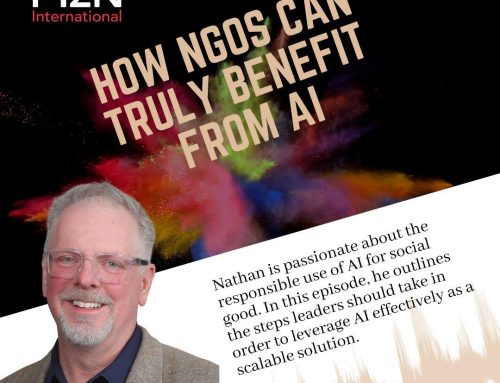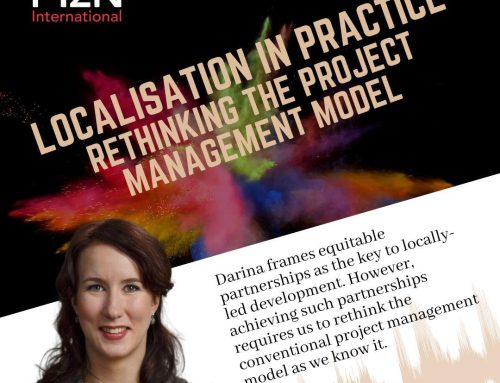When COVID-19 hit last year, many of our partner NGOs were severely affected in their ability to keep operating smoothly and acquire funding. Though they reacted quickly to the crisis by nurturing relationships with donors, communicating transparently, and making the most of technology, we are now a year down the line, and many are still suffering as the pandemic rages on. The organisations that managed to keep afloat are now at the stage in which new funding and/or new funders are needed, but the race for funding has become even more competitive. Funders have to evaluate applications more critically and have a larger number to select from. We have put together six tips on how you can make your organisation stand out so you can keep your institutional funding pipeline growing despite the competition.
The race for funding has become even more competitive during the pandemic.
1. Let your data tell your story
Visual, engaging information and data about the changes your organisation brings about are vital. Times are long gone where simple, quantitative output reporting is sufficient. Donors want to see tangible results and changes. What are the stories of change that your partners and stakeholders tell about your work? Where are the infographics depicting, in a simple way, your pathway of change? Having compelling, visualised data gives you a great advantage. Donors will take note of you, understanding how you catalyse change and ultimately impact your stakeholders positively.
2. Make room for innovation
Innovation is the one obvious area that will make you stand out, yet challenging to realise for NGOs. We recommend using some scenario planning tools to develop perspectives on how the future might unfold in your area of work. Then adapt your goals and results to those scenarios, and allow your teams to think of new ways to achieve those goals. Get people into a frame of mind where they can remove themselves completely from how things have been done in the past and focus on the results of the future. Allow for upside-down and inside-out thinking.
3. Focus on the how
Assess and evaluate HOW you do your work. Are you using the most efficient and effective approaches and tools to deliver your work? Are the technologies you use and processes you apply up to speed? Think of smart and agile ways of working. Would it be possible to merge your HR, Finance and other Operations units with others or maybe outsource parts of it? What are the best ways for your staff to deliver their work? Is there room for more digitalisation and less rigid management structures? This might not only help you to save money but also free up time and human resources for other areas of work. Increased transparency and easier workflows will contribute to your team’s satisfaction when at work. And a big plus – donors love to hear the stories of how you have become more efficient.
Think of smart and agile ways of working. Donors love to hear the stories of how you have become more efficient.
4. Invest in opportunity search
Allocate more time and resources to researching funding opportunities and potential new donors. Generally, NGOs often neglect to plan time and human resources for pipeline research. Right now, it might be one of your most important investments.
5. Make your proposals stand out
Consider making minor adjustments to the design of your bids, applications and proposals, and rethink how you write them. How efficient is your proposal writing process? Have you gotten any feedback from donors about your proposals? If possible, have a call or meeting before submitting your proposals to help you understand what is important to the donor. Good proposals stand out if they offer interesting and relevant content written in clear and concise language. MzN’s depth of knowledge and decades of experience with donor’s formal policies and informal preferences make us proposal writing experts. Use our proposal development form if you need assistance writing or editing a draft proposal.
Good proposals stand out if they offer interesting and relevant content written in clear and concise language
6. Rethink your fundraising strategy
If your organisation is still between 80% and 100% dependent on institutional funding, we urgently suggest you re-think your fundraising strategy. What can you do to diversify your income? Even if your largest type of funding will come from institutional donors, have you harvested all the opportunities within institutional funding? Have you ever considered applying for a tender instead of a grant? Are there any income-generating activities that your organisation can perform without significantly changing the way you do your work? Once you assess your income, you might be surprised about the various models and opportunities that you are missing out on.
The year 2021 has started out rocky for many NGOs and some might not survive it. It is time to get in the driver’s seat and decisively act to make your organisation stand out to institutional donors. Our six suggestions only require a minimal shift of resources and investments and a slightly different way of thinking.
It is time to get in the driver’s seat and decisively act to make your organisation stand out to institutional donors.
The best version of your organisation is within your reach – contact us at MzN and we will happily help you make that vision a reality.





